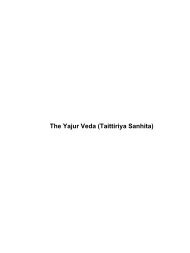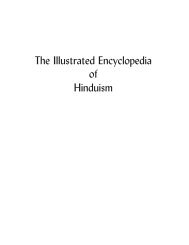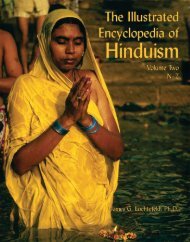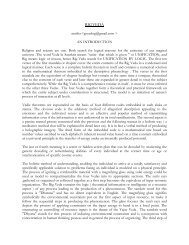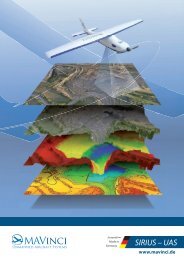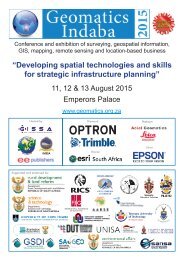A Concise Encyclopedia of Hinduism Klaus K Klostermaie
Create successful ePaper yourself
Turn your PDF publications into a flip-book with our unique Google optimized e-Paper software.
13 Introduction<br />
caused by ignorance (avidyä) concerning the true nature <strong>of</strong> reality.<br />
Hindu philosophies are immensely sophisticated, <strong>of</strong>ten anticipating<br />
questions that only now are being raised in Western philosophy. The<br />
hundreds <strong>of</strong> works that have been written by Hindu philosophers over<br />
the past thousand and more years deserve the attention <strong>of</strong> the best minds.<br />
Political <strong>Hinduism</strong> and Hindu jagaran<br />
The ancient and medieval realms <strong>of</strong> Hindu kings were Hindu kingdoms,<br />
i.e. <strong>Hinduism</strong> was also their political system. When India became a<br />
Muslim country and then a British colony, <strong>Hinduism</strong> largely turned<br />
inwards and retreated into piety and spirituality. However, there<br />
always remained some individuals like Ÿivajï and some groups <strong>of</strong> militant<br />
Nägas who attempted and partially succeeded in reaffirming political<br />
power for <strong>Hinduism</strong>.<br />
The first modern Hindu political party was founded in 1909 by<br />
Pandit Mohan Malaviya, a prominent member <strong>of</strong> the Ärya Samäj: the<br />
Hindü Mahäsabhä, as it was called, in reminiscence <strong>of</strong> classical Hindu<br />
assemblies, demanded for Hindus the right to govern themselves by<br />
Hindu laws.<br />
The call for a Hindu rä•flra, a Hindu state, was also reiterated by the<br />
later Hindu parties, the Jana Sangh (established in 1950), the Janata<br />
Party (established in 1977) and the Bhäratïya Janatä Party (established<br />
in 1980), which eventually became the ruling party at the centre in New<br />
Delhi and in several Indian states.<br />
Hindu jagaran, a great awakening <strong>of</strong> Hindu consciousness, was proclaimed<br />
by non-political, ‘cultural’ organizations such as the Rä•tøïya<br />
Svayamsevak Sangh (RSS; founded in 1926) and the Viÿva Hindü<br />
Pari•ad (VHP; founded in 1964). There are many indications that the<br />
Hindu awakening has been successful and it remains to be seen how far<br />
the notion <strong>of</strong> India as a Hindu nation will be carried.<br />
The exercise <strong>of</strong> political power by Hindus in a contemporary democratic<br />
setting may not only transform India but also <strong>Hinduism</strong>. For the<br />
first time in several hundred years Hindus might be able to convene a<br />
dharmapari•ad, a council empowered to bring about changes in religious<br />
law and practice. It will be a chance to modernize <strong>Hinduism</strong> and<br />
to find out how valid the claims voiced by Hindus over the past hundred<br />
years are that Hindu solutions to India’s problems are better than<br />
Western ones.




